- Home
- Iain Banks
The Bridge Page 2
The Bridge Read online
Page 2
The fellow was dressed something like myself; in truth, any other apparel in that frigid atmosphere would have invited a quick end. His coat might have been a little longer, his body a little more thick set than mine. He and I came level with the shaking heads of our horses. My heart was beating, now, with a rapidity and a ferocity I could not recall having experienced before; a sort of horror drew me on, made me walk towards this still not-quite-seen figure. It was as if some magnetic repulsion, which before had kept our two carriages from meeting and passing, had now been reversed, and so sucked me inexorably forward, drawing me towards something my heart made clear I feared - or should fear - utterly, in the way some people are fatally attracted towards an abyss while standing on its very edge.
He stopped. I stopped. It was with a surging sense of relief, a brief feeling of total and unalloyed joy that I saw this man did not have my own face. His face was squarer than my own, his eyes were closer together and deeper set, and over his mouth there was a dark moustache. He looked at me, standing in the light of my lamps as I stood in the light of his, and inspecting my face with, I imagined, the same intense and relieved expression I exhibited myself. I started to speak, but got no further than 'My good -' before I stopped. The man had started to talk at the same time as I had; some short word or phrase, seemingly addressing me as I had been about to address him. It was, I was now sure, a foreign tongue he used, but I could not identify it. I waited for him to speak again, but he stood without speaking, apparently studying my face.
We shook our heads at the same moment. 'This is a dream,' I said quietly, while he spoke softly in his own tongue. 'This cannot be happening,' I continued. 'This is not possible. I am dreaming and you are something from within myself.' We fell silent, together.
I looked at his carriage, as he looked at mine. His conveyance appeared to be the same type as my own. Whether his was sealed, locked and strapped shut like mine, whether its contents were as important and awful as those secured in my carriage, I could not tell.
I stepped suddenly to one side; he moved at the same instant, as though to block me. We stepped back. I could smell the fellow now; a strange odour of some musky perfume mingling with stale hints of a foreign spice or bulb. His face wrinkled slightly, exactly as if he were smelling something from my person, something he found vaguely unsettling or distasteful. One of his eyebrows flickered oddly, just as I remembered my pistol. I had the most absurd and fleeting mental picture of us pulling and firing our revolvers, and the lead projectiles meeting and striking each other in mid air, flattening into a perfectly circular coin of squashed metal. My imperfect double smiled, just as I did so myself. We shook our heads; this motion at least seemed not to require translating, though it occurred to me that a similarly slow and thoughtful nodding of the head would have suited the situation just as well.. We each stepped back, and looked around at the quiet, cold, barren landscape of that high place as though in its very desolation we might find something to inspire one of us, or both.
I could think of nothing.
We each turned, walked back to our carriages and climbed into our seats.
A dim figure in the shadow behind the uneven light of his carriage's lamps (as I no doubt was to him), he sat, motionless for a while, then took up the reins - just as I did - with a sort of resigned shrug and a bending of the back and a grasping with one hand which looked like the motions of an old man (and I mirrored him, and I knew a sort of ancient bitterness, a heaviness, an ice-brittle thickness which invaded me, more deadly and intense than any air-borne chill).
He tugged gently at the heads of his horses; I signalled to mine in the same fashion. We started to turn our carriages round, using our own confined area of the small passing place, edging back and forth and whistling together at our horses.
When we are level, I decided, square on like battling ships of the line, I shall draw my gun and shoot. I cannot go back; no matter that he will not give way, regardless of his determination; I must go on, I have no choice.
We slowly manoeuvred our awkward vehicles until they were abreast. His, like mine, was locked, shuttered, strapped tight. He looked at me, and reached, with an almost complacent slowness, into his coat, just as I did the same thing, feeling past my jacket to the inside pocket and carefully withdrawing my gun. Would he remove his glove? We each hesitated, then he unbuttoned his glove at the wrist, just as I did. He laid the glove on the seat as his side, then raised the gun to point at me.
He pulled the trigger just as I did. There were two small clicks, nothing more.
We each pulled the chambers open; in the light of one lamp I could see the hammer in my gun had struck home on the base of the cartridge; a tiny dent showed on the copper-coloured metal. The round, like his apparently, had been damp, or somehow badly made. This happens, occasionally.
He looked at me again, and our smiles were sad. We each put our revolvers back in our jackets, then we turned our carriages fully round, and I with my dread load, and he with his, rode back, towards the valleys and the clouds.
'. . .then we both fire at the same time, or at least we both pull the triggers at the same time, but nothing happens. Both rounds are duds. So we just. . . smile at each other, in a resigned sort of way, I suppose, and finish turning the carriages right round, and then head back the way we came.' I stop talking.
Dr Joyce looks at me over his gold-rimmed spectacles. 'Is that it?' he says. I nod.
'Then I wake up.'
'Just like that?' Dr Joyce sounds annoyed. 'No more?'
'End of dream,' I tell him, crisply emphatic.
Dr Joyce looks profoundly unconvinced (I don't blame him really, this is all a pack of lies), and shakes his head in what may well be a gesture of exasperation.
We are standing in the centre of a room with six black walls and no furniture; it is a rackets court, and we are near the end of a game. Dr Joyce - fiftyish, not unfit, but a little puffy - believes in sharing the pursuits of his patients where he can; we both play rackets, so rather than sit in his office we came here for a game. I've been telling him my dream in instalments between points.
Dr Joyce is all pink and grey: grey frizzy hair, pink face, and mottled grey-pink arms and legs poking out from his grey shorts and shirt. His eyes, however, behind the gold-rimmed, chain-secured glasses, are blue: sharp, hard blue and set in his pink face like fragments of glass stuck in a plate of raw meat. He is breathing hard (I am not), perspiring profusely (I only broke sweat in the last point), and looking very suspicious (as I've said, with good reason).
'You wake up?' he says.
I try to sound as annoyed as I can: 'Damn it man, I can't control what I dream. ' (A lie.)
The doctor issues a professional sigh and uses his fielding-racket to scoop up the ball he missed at the end of the last point. He stares intently at the serving wall. 'You to serve first, Orr,' he says sourly.
I serve, followed by the doctor. Rackets is a game for two players, each with two rackets; a fielding-racket and a shot-racket. It is played in a hexagonal, black-painted court, with two pink balls. This last fact, subjected to the unsubtle allotrope of humour which passes for wit on the bridge, has resulted in rackets being known as 'the man's game'. Dr Joyce knows the game better than I do, but he is shorter, heavier, older and less well co-ordinated. I have been playing the game for only six months (my physiotherapist recommended it), but I win the point - and the game - easily enough, fielding one ball while the doctor fumbles the other. He stands, panting, glaring at me, a very picture of pink pique. 'You're sure there's no more?' he says.
'Positive,' I tell him.
Dr Joyce is my dream doctor. He specialises in the analysis of dreams and believes that by analysing mine he will be able to discover more about me than I am able to tell him through any conscious effort (I am an amnesiac). Using whatever he finds by this method, he then hopes somehow to jog my delinquent memory back into action: hoopla! With one mighty leap of the imagination I shall be free. I have been doing my
honest best to co-operate with him in this noble venture for over half a year now, but my dreams have always been either too vague to be accurately recalled, or too banal to be worth analysing. In the end, not wanting to disappoint the increasingly frustrated doctor, I have resorted to inventing a dream. I rather hoped my dream of the sealed carriages would give Dr Joyce something to get his yellow-grey teeth into, but from his peeved look and belligerent stance, I get the impression that this is not the case.
He says, 'Thanks for the game.'
'My pleasure.' I smile.
In the showers, Dr Joyce hits below the belt.
'Your, ah, libido, Orr. Quite normal?' He soaps his paunch; I am rubbing foamy circles on my chest.
'Yes, doctor. How's yours?' The good doctor looks away.
'I was asking in a professional capacity,' he explains. 'Wejust thought there might be some problems. If you're sure...' His voice trails away, and he steps under the stream of water to rinse off.
What does the good doctor want? References?
Showered and changed, and after a call at the rackets club bar, we take an elevator to the level where Dr Joyce's consulting rooms are. The doctor looks more at home in his grey suit and pink tie, but he is sweating still. I feel refreshed and cool in trousers, silk shirt, waistcoat and frock coat (carried over one arm for now). The elevator - soft class: leather seats, pot plants - hums as it climbs. Dr Joyce goes to sit down on a bench by one wall, near the attendant, who is reading a paper. The doctor takes out a slightly off-white handkerchief and mops his brow.
'So, what do you think this dream means then, Orr?'
I look at the newspaper-reading attendant. We three are the only people in the lift, but I would have imagined that even a lift-boy's presence would be sufficient to prohibit what I thought was meant to be a confidential exchange. That was why we were heading for the good doctor's office. I stare round at the elevator's wooden panelling, leather furniture and rather unimaginative seascape prints (and decide that I prefer lifts with outside views).
'I've no idea,' I say. Once - I seem to remember - I thought that what my dreams meant was exactly what Dr Joyce was supposed to tell me, but the good doctor disabused me of this notion some time ago, while I was still struggling to have dreams meaningful enough for him to get to work on.
'But that's just it,' Dr Joyce says wearily, 'you probably do know.'
'But I don't want to tell you?' I suggest.
Dr Joyce shakes his head. 'No, you probably can't tell me.'
'So why ask?'
The elevator is slowing to a stop. The doctor's offices are about midway up the top half of the bridge, equidistant from the always steam-wreathed train deck and one of the often cloud-entangled summits of the great edifice. A man of no little influence, his offices are on the outside of the main structure with one of those much sought after sea views. We wait for the doors to open.
'What you have to ask yourself, Orr,' Dr Joyce says, 'is what this sort of dream means in relation to the bridge.'
I look at him. 'The bridge?'
'Yes,' he nods.
'You've lost me,' I tell him. 'I don't sec what possible connection there can be between the bridge and my dream.'
Another doctorly shrug. 'Perhaps the dream is a bridge,' he muses as the inner doors slide back. He takes out his travel-pass to show the attendant; 'Perhaps the bridge is a dream.'
(Well, that's a great help.) I show the attendant my hospital identity bracelet, then follow the good doctor along a broad, carpeted corridor to his offices.
The identity bracelet on my right wrist is a plastic strap which contains some sort of electronic device detailing my name and residence. It describes the nature of my affliction, the treatment I am undergoing, and the name of my doctor. Printed on the plastic strap is my name: John Orr. This is not really my name; it is the name I was given by the bridge's hospital authorities when I arrived here. 'John' because it is a common, inoffensive name, 'Orr' because when I was fished out of the waters surging around one of the bridge's great granite piers, there was a large, livid, circular bruise on my chest, an almost perfect circle stamped on my flesh (and beyond; I had six broken ribs). It looked like an O. 'Orr' was the first name starting with an O that occurred to the nurses charged with looking after me; it is they who are by tradition allowed to name foundlings, and as I was discovered without any form of identification this definition was extended to myself.
My chest, I might add, still aches on occasion, as if that curious, unexplained, mark remained there in all its multicoloured splendour. I need hardly add that I had also received head injuries, originally presumed to be the cause of my amnesia. Dr Joyce is inclined to attribute the ache which I experience in my chest to the same trauma which caused my amnesia. He believes my inability to remember my past life.was caused not so much by the head injuries I received as by some other, perhaps linked, psychological shock, and that the answer to the question my amnesia poses is to be found in my dreams. This is why he's taken me on: I am an Interesting Case, a challenge. He will discover my past for me, no matter how long it takes.
In the doctor's outer office we encounter the appalling young man who is the doctor's receptionist. He is a breezy and bright fellow, always ready with a joke or a quip, ever willing to provide coffee or tea and to help people on or off with their coats; never gloomy or morose, rude or unpleasant, and always interested in what Dr Joyce's patients have to say. He is slim, neatly dressed, well manicured; he wears a pleasantly unobtrusive scent applied sparingly but effectively, and his hair is neat and smart without looking artificial. Need I add that he is heartily despised by every one of Dr Joyce's patients I have ever spoken to?
'Doctor!' he says, 'so good to see you again! Did you enjoy your game?'
'Oh , yes,' the doctor says unenthusiastically, looking round the waiting area. There are only two other people in the room: a policeman and a thin, worried-looking man with bad dandruff. The worried-looking man is sitting, eyes closed, on one of the room's half-dozen or so seats. The policeman is sitting on top of him, sipping a cup of coffee. Dr Joyce takes in this arrangement without a second glance. 'Any calls?' he asks the Appalling Young Man, who is standing, slightly bowed, with his hands placed fingertip to fingertip.
'None urgent, sir; I've left a chronological list on your desk, with tentative prioritisations re the replies - in ascending order - in the left margin. Cup of tea, Dr Joyce? Coffee, maybe?'
'No, thank you.' Dr Joyce waves the Appalling Young Man to one side and escapes through to his office.
I hand the AYM my coat as he says, 'Good morning Mr Orr! Can I take your - oh, thank you! Enjoy your game, Mr Orr?'
'No.'
The policeman continues to sit on top of the thin man with the dandruff. He looks away with an expression somewhere between surliness and embarrassment.
'Oh dear,' the young receptionist says, looking desolate. 'I am sorry to hear that, Mr Orr. Cup of something to cheer you up, perhaps?'
'No thanks.' I hurry through to join the doctor in his office. Dr Joyce is examining the prioritised list lying under a paperweight on the blotter of his impressively large desk.
'Dr Joyce,' I say, 'why is there a policeman sitting on top of a man in your outer office?'
He looks towards the door I have just closed.
'Oh,' he says, going back to the typed list, 'that's Mr Berkeley; he has a non-specific delusion. Keeps thinking he's an article of furniture.' He frowns, taps one finger on an item on the list. I sit down in an unoccupied chair.
'Really?'
'Yes; what he thinks he is varies from day to day. We tell whoever's guarding him just to humour him, where possible.'
'Oh. I thought perhaps they were some sort of minimalist radical theatre group. I take it Mr Berkeley thinks he's a seat at the moment.'
Dr Joyce frowns. 'Don't be stupid, Orr. You wouldn't put one seat on top of another, would you? He must think he's a cushion.'
'Of course.' I nod. 'Why the po
lice guard?'
'Oh, it can get a bit tricky; every now and again he thinks he's a bidet in a ladies' toilet. He's not normally violent, just...' Dr Joyce stares vacantly at the pastel-pink ceiling of his office for a moment. He gropes for the right word, then dredges down '... insistent.' He goes back to the list.
I sit back. Dr Joyce's office is floored with teak, covered with occasional, delicately hued carpets of a banal abstract design. The imposing desk has a matching filing cabinet and brace of tome-stuffed bookcases, and there is a low table with tastefully bland chairs on one of which I am sitting. Half of one wall of the doctor's inner office is window, but the view is concealed by vertical blinds. Translucent, the sun-struck blinds glow in the morning light, providing our illumination.
The doctor crumples the neatly typed sheet into a ball and throws it into his waste-bin. He drags his seat round from behind his desk and positions it so that we can sit facing each other. He takes a notebook from the desk top and puts it on his lap, then removes a small silver propelling pencil from his jacket's breast pocket.
'Right, Orr, where were we?'
'I believe the last supposedly constructive thing you said was that the bridge might be a dream.'
Dr Joyce's mouth droops down at the corners. 'How would you know if it wasn't?'
'How would I know if this wasn't?'
The doctor sits back, a knowing look on his face. 'Quite.'
'Well, how do you know it isn't a dream, doctor?' I smile. The doctor shrugs.
'No point asking me that; I'd be part of the dream.' He leans forward in his seat; I do the same thing, so that we are almost nose to nose. 'What does the sealed carriage mean?' he asks.
'I guess it shows I'm frightened of something,' I snarl.
'Yes, but what?' the doctor hisses from close range.
'I give in; you tell me.'

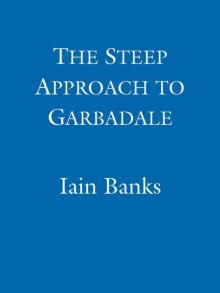 The Steep Approach to Garbadale
The Steep Approach to Garbadale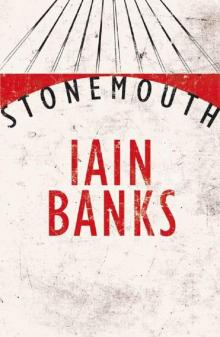 Stonemouth
Stonemouth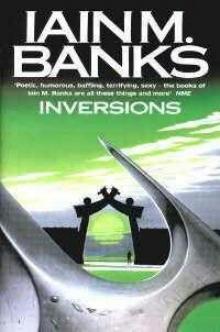 Inversions c-6
Inversions c-6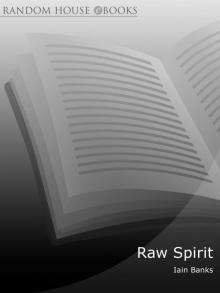 Raw Spirit: In Search of the Perfect Dram
Raw Spirit: In Search of the Perfect Dram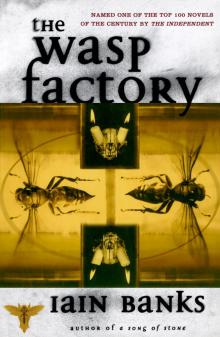 The Wasp Factory
The Wasp Factory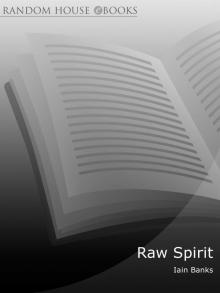 Raw Spirit
Raw Spirit Walking on Glass
Walking on Glass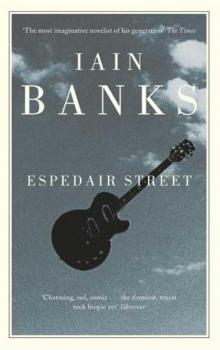 Espedair Street
Espedair Street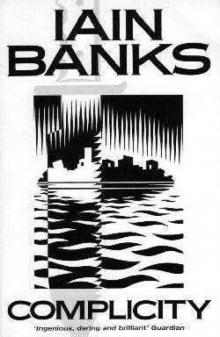 Complicity
Complicity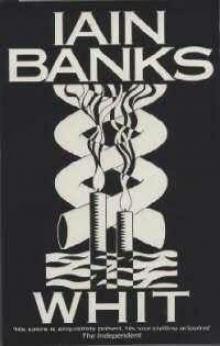 Whit
Whit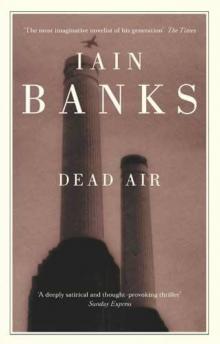 Dead Air
Dead Air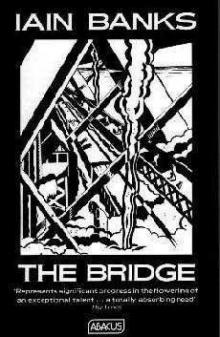 The Bridge
The Bridge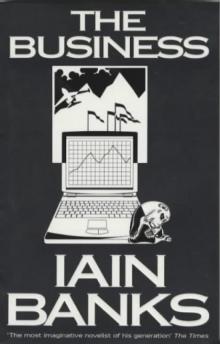 The Business
The Business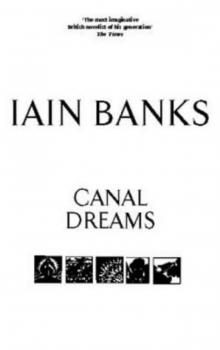 Canal Dreams
Canal Dreams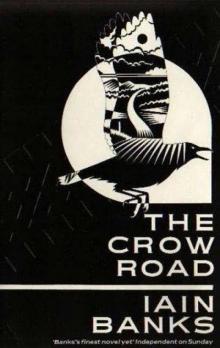 The Crow Road
The Crow Road